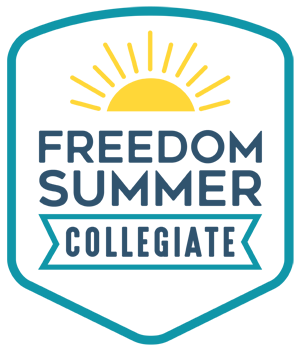Reflection from Michael Roswell
After overhearing my honey bee biology lecture, one of my Freedom Summer Collegiate instructor colleagues remarked that I was “fluent” in my discipline. I bristled, immediately thinking of the following words, uttered by education scholar Lisa Delpit’s colleague, Cathy:
"People keep pushing this fluency thing," said Cathy. "What do they think? Our children have no fluency? If they think that, they ought to read some of the rap songs my students write all the time. They might not be writing their school assignments but they sure are writing. Our kids are fluent. What they need are the skills that will get them into college."
Ok, 3 years into a Ph.D. program, I’m fluent in my discipline. Now, how about teaching? How effectively am I doing what Cathy insists is the real work: helping equip students with the skills they need to get into college. In the same lecture earlier in the day, some of my students’ heads lolled. While talking about the genetics of sex determination in hymenoptera (that is, how bees, ants, and wasps become male or female), I realized that this stuff, this “college level” content, wasn’t what the class should be about, not what I was asked to do. I closed the lecture with a few videos of my beehives from New Jersey, reclaiming minds from their late June daydreams. We changed rooms and activities and the students indicated they would forgive me for a boring lecture.
I was lucky--or, as it sometimes felt, unlucky--to be the only FSC teaching fellow with two sections to teach, so I tried a new approach with my second class of the day. With them, I hewed away from big words and technical definitions. I kept my second version of the lecture very conversational, and light on the biology. This time my slides weren’t even in powerpoint, just a series of photos and videos I pulled up on the laptop and projected. The students were energized and the conversation was not simply structured by their questions, it was animated by them. Maybe I seemed fluent because I was unprepared.
The next day, I administered a test; it showed no difference between what the students in the two different classes learned. One lecture technical, with college-level content. Half the students checked out for half the time, while the most eager, prepared students are connecting high school biology with exciting real world phenomena. The other lecture free from technical language, and outreach-level content. All the students on board the whole time. Students showed similar levels of learning and knowledge in each case. Which one was better?
Fluency? Skills? Exposure? Enthusiasm? What did I leave my students with this summer? What do they want, do they need, can a program like ours deliver? Well, they got some exposure, so I hope the instructors who claimed, “exposure is everything” were right. They were exposed to ideas, images, texts, expectations, and attitudes this summer that were variously collegiate, scientific, unfamiliar, and potentially generative. Often, though, I think that’s where I stopped. I didn't get to a split between fluency and skills. I got to exposure.
I felt optimism on the last day. One skeptical student who began the month wary of anything smelling of exploration, not only revealed that the class was enjoyable, but also that it inspired some home insect collecting. Another student, who only days before nearly quit in a frustrated, confused huff, presented the course's key ideas proudly and confidently in the final poster presentation. The exposure, it turns out, had significant influence, and not only on the easiest-to-reach students.
I hear Delpit’s friend Cathy as I look at final ACT scores. My students didn’t achieve gains on the ACT over the month of June.
I want to shout that success in our program can’t, of course, be measured by 3-week changes in ACT scores. Instead we hope it shows in college retentions and graduations a few years from now, in the courses and disciplines our students might engage that they wouldn’t have otherwise, in the college essay my 10th graders will write 2 years from now. But in opting for exposure (and not demanding understanding, ownership, and proficiency across the board), in what ways have I served the kids? Did I expose them to the right stuff?
During our orientation we were warned not to conflate being in the Delta and doing good work. The mantra, “exposure is everything” is a slippery slope leading to the same confusion. I am proud of my students' achievements this summer, whether or not they register in direct ACT score gains, but I am left wondering, did I do the work, or was I just here?
Michael Roswell is a Ph.D. Candidate in Ecology and Evolution at Rutgers University. He taught a course on Pollination Ecology to students at the Rosedale Freedom Project and the Sunflower County Freedom Project. We can vouch for the fact that he definitely "did the work."
